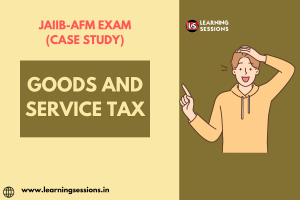The Goods and Services Tax (GST) is an extensive, multi-stage, destination-based tax that has significantly impacted the Indian economy and its financial systems. Understanding the implications of GST on banking, accounting, and financial management is crucial for JAIIB aspirants. In the Accounting and Financial Management (AFM) module of the JAIIB, GST forms a principal area of study, highlighting how taxation affects financial operations, compliance, and reporting. Learning Sessions presents this article explaining the basic concepts of GST, its relevance in banking, and presents a real-world case study that demonstrates its application.

📚 JAIIB Study Resources 📚
👉 Check Here
👉 Check Here
👉 Check Here
👉 Get Tests Here
👉 Check Here
DOWNLOAD PDF GOODS AND SERVICE TAX -CASE STUDY
GST is a unified indirect tax system that replaced a host of indirect taxes like VAT, service tax, and excise duty. It is levied on the supply of goods and services and is collected at each stage of production and distribution, with input tax credit provided to businesses for the taxes they’ve already paid.
For the extensive preparation of candidates, get details through our YouTube videos for JAIIB AFM Module wise Syllabus with explanations and tips to help candidates in their preparation journey.
You may also like these JAIIB case studies:
JAIIB | AFM | VALUATION OF BONDS
JAIIB | AFM | CAPITAL STRUCTURE
Types of GST:
- CGST (Central Goods and Services Tax): Collected by the central government on intra-state sales.
- SGST (State Goods and Services Tax): Collected by the state government on intra-state sales.
- IGST (Integrated Goods and Services Tax): Collected by the central government on inter-state sales and imports.
GST impacts several areas in banking operations, such as processing fees, transaction charges, loan servicing, and other financial services. Similarly, Under GST, businesses can claim input tax credits on the tax paid for goods and services used for business purposes. Banks and financial institutions must adhere to the filing requirements for GST, including filing regular returns, reconciling input credits, and ensuring accurate tax reporting to avoid penalties.
In the end it can be said that the introduction of the Goods and Services Tax (GST) has transformed the taxation landscape in India, affecting various sectors, including banking. For JAIIB aspirants, understanding the impact of GST on financial services is crucial. Learning Sessions provides additional information about JAIIB AFM CROSS RATES by giving examples of real life scenarios.
Learn more about this case study through our YouTube channel and PDF.
Get access to our Telegram Channel for free Pdfs of JAIIB.
You May also Find these JAIIB Posts Useful





